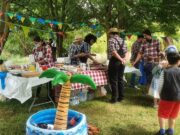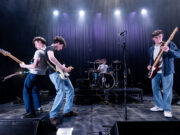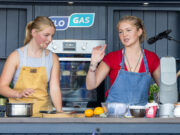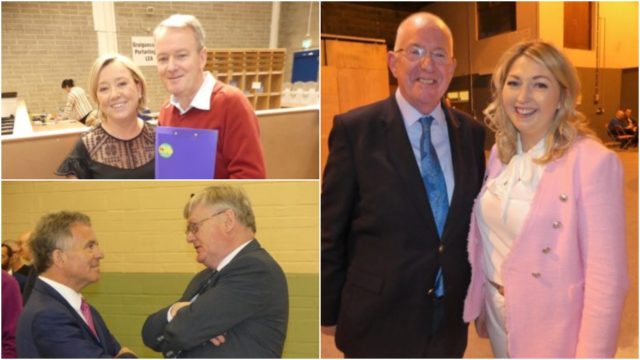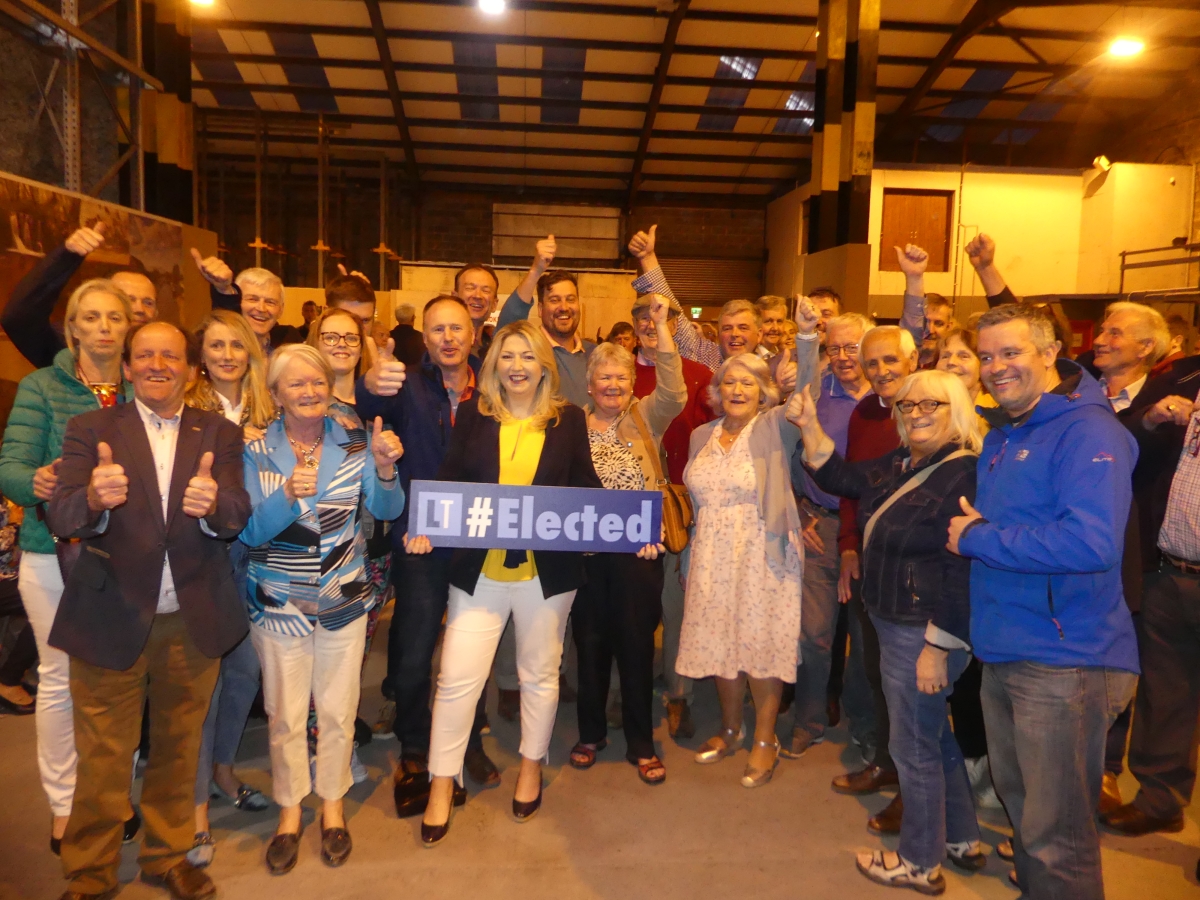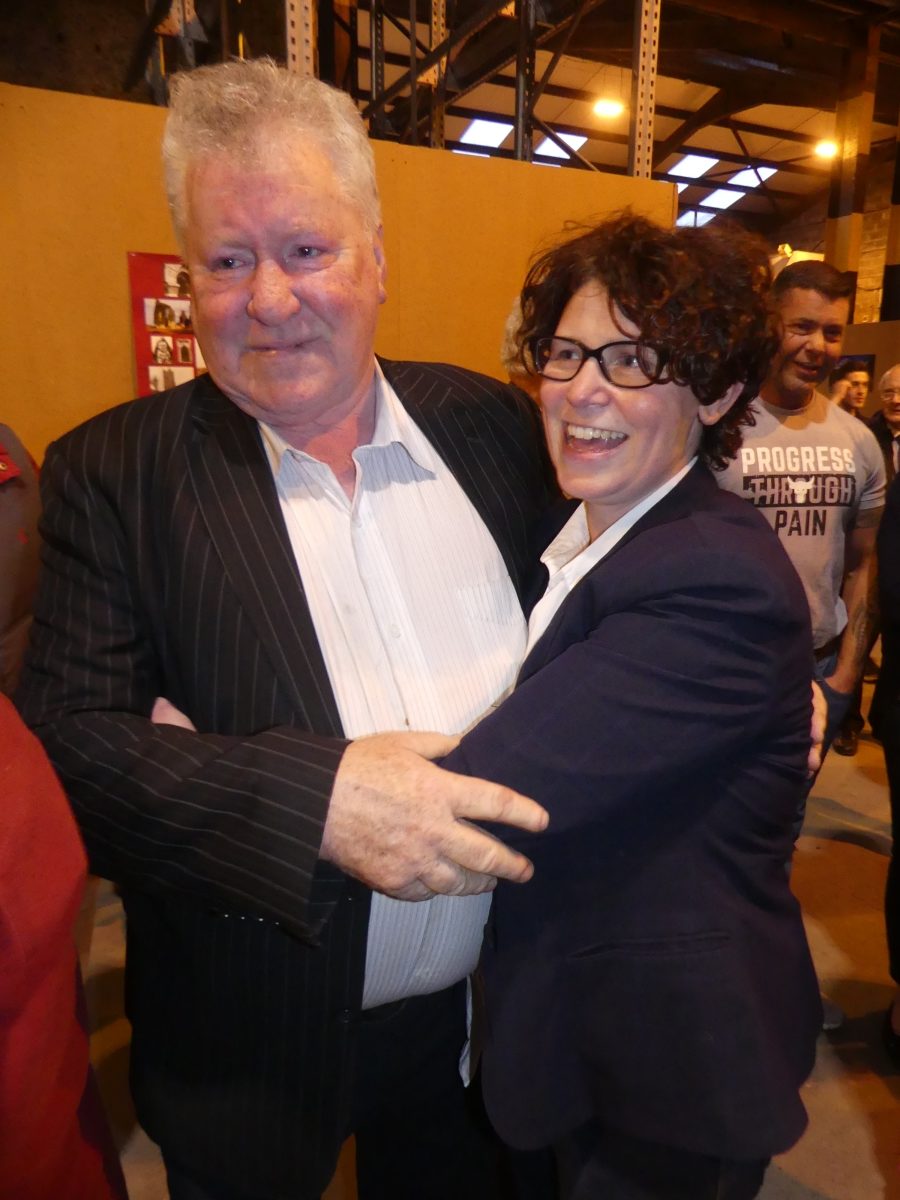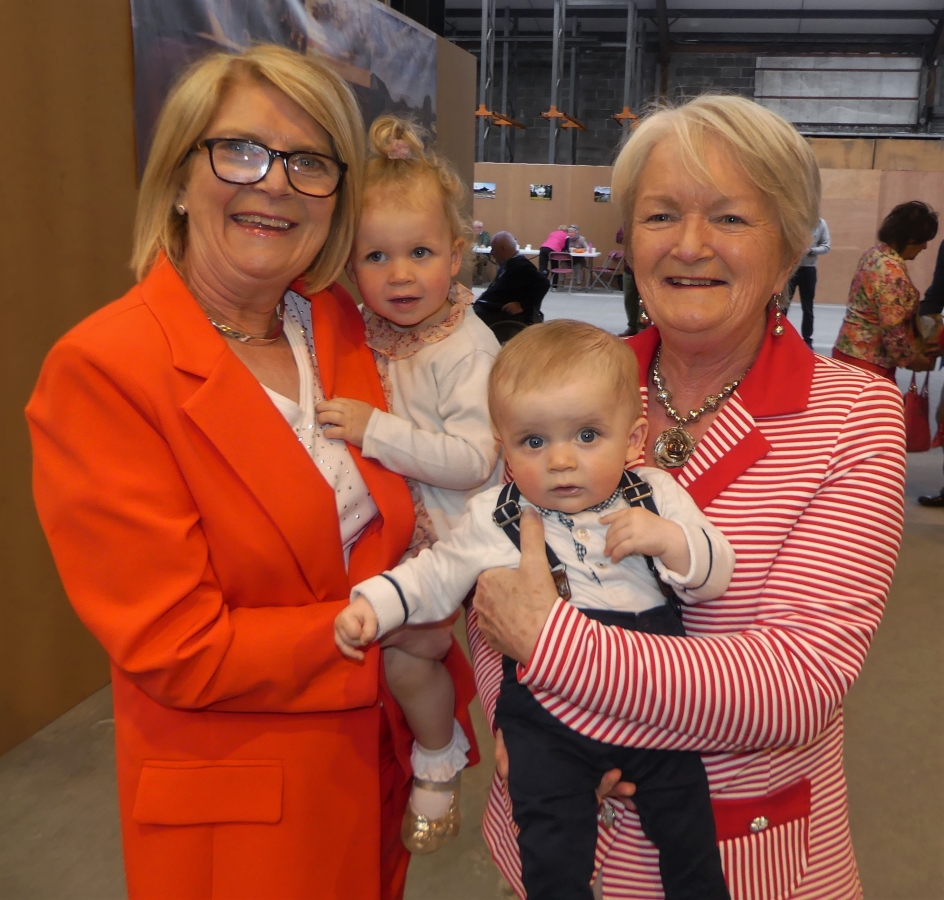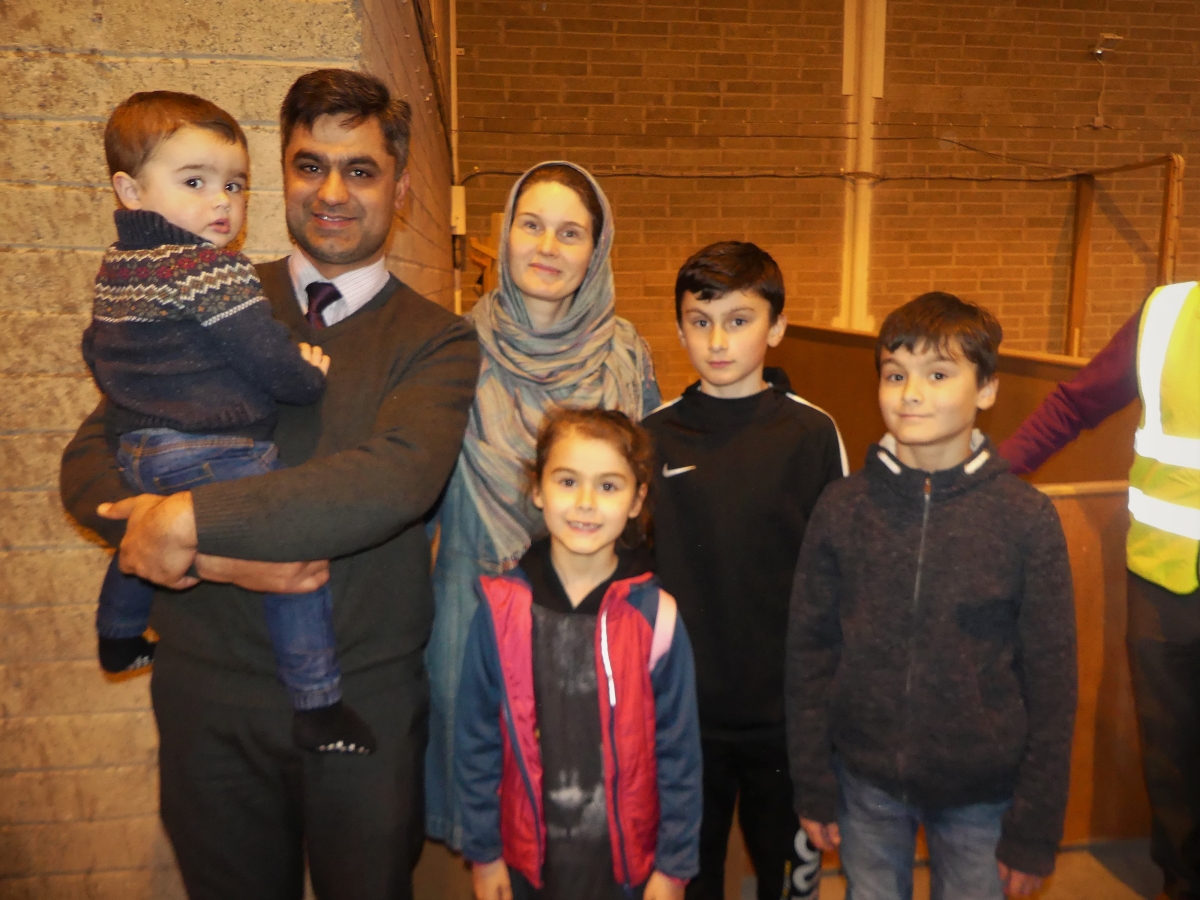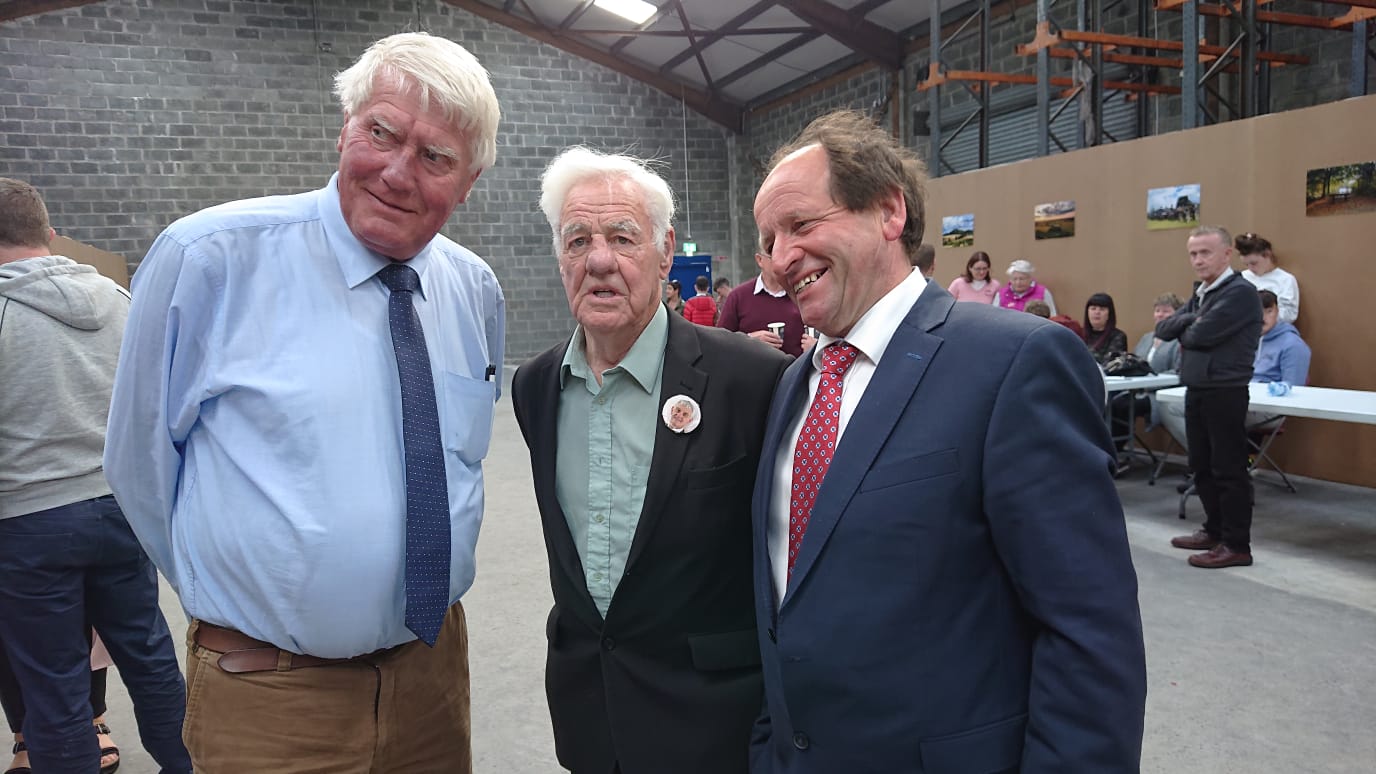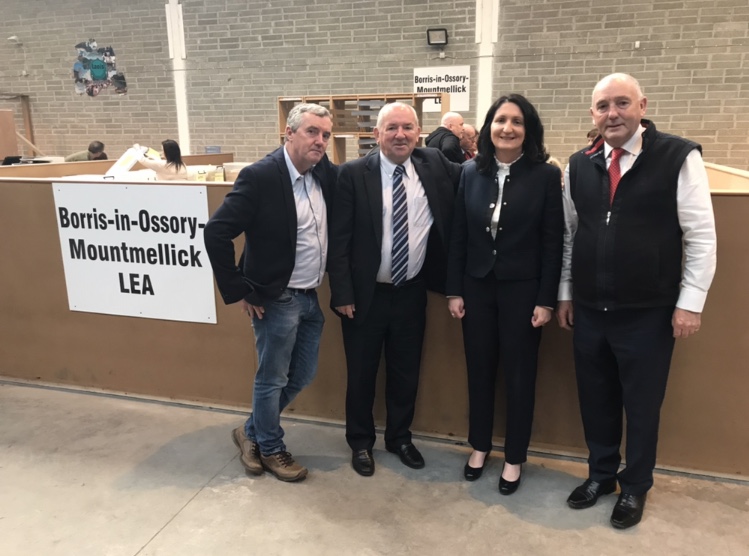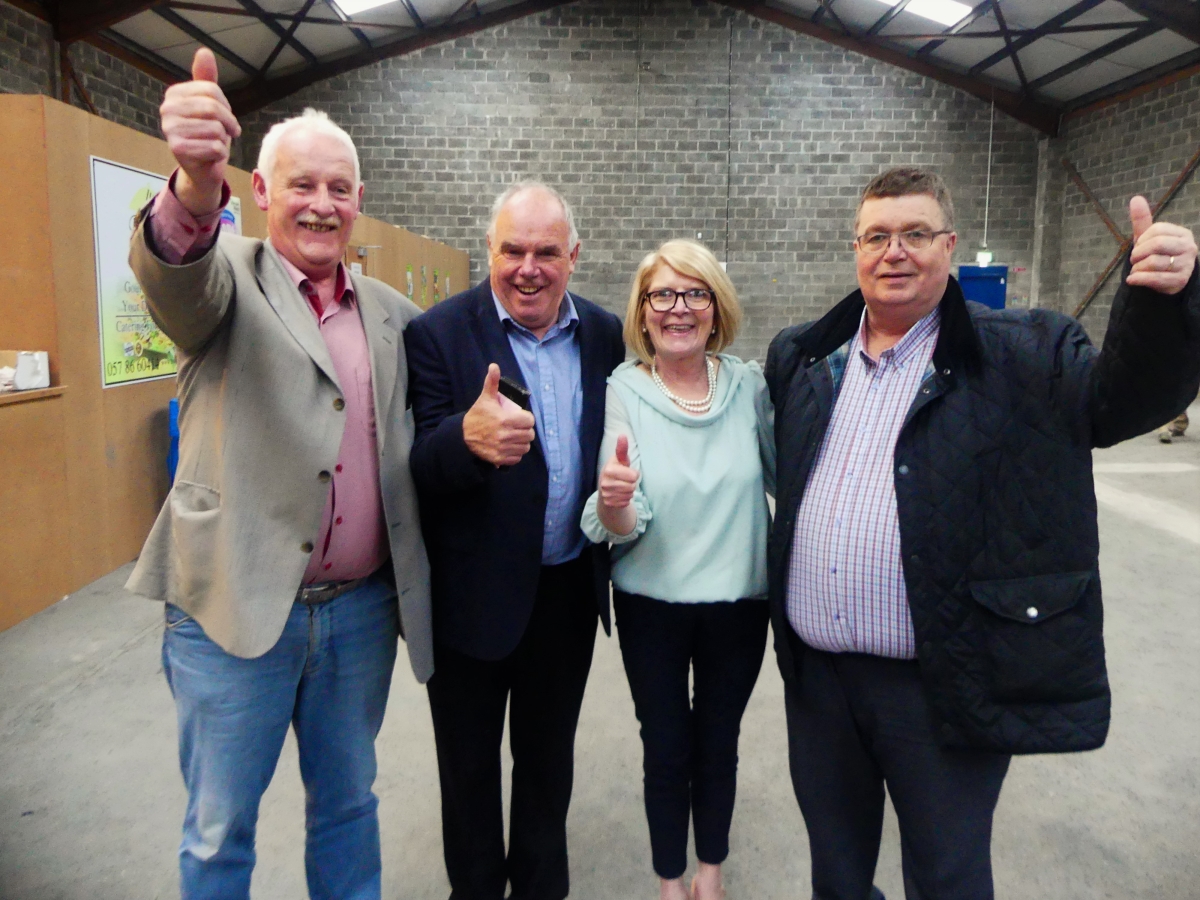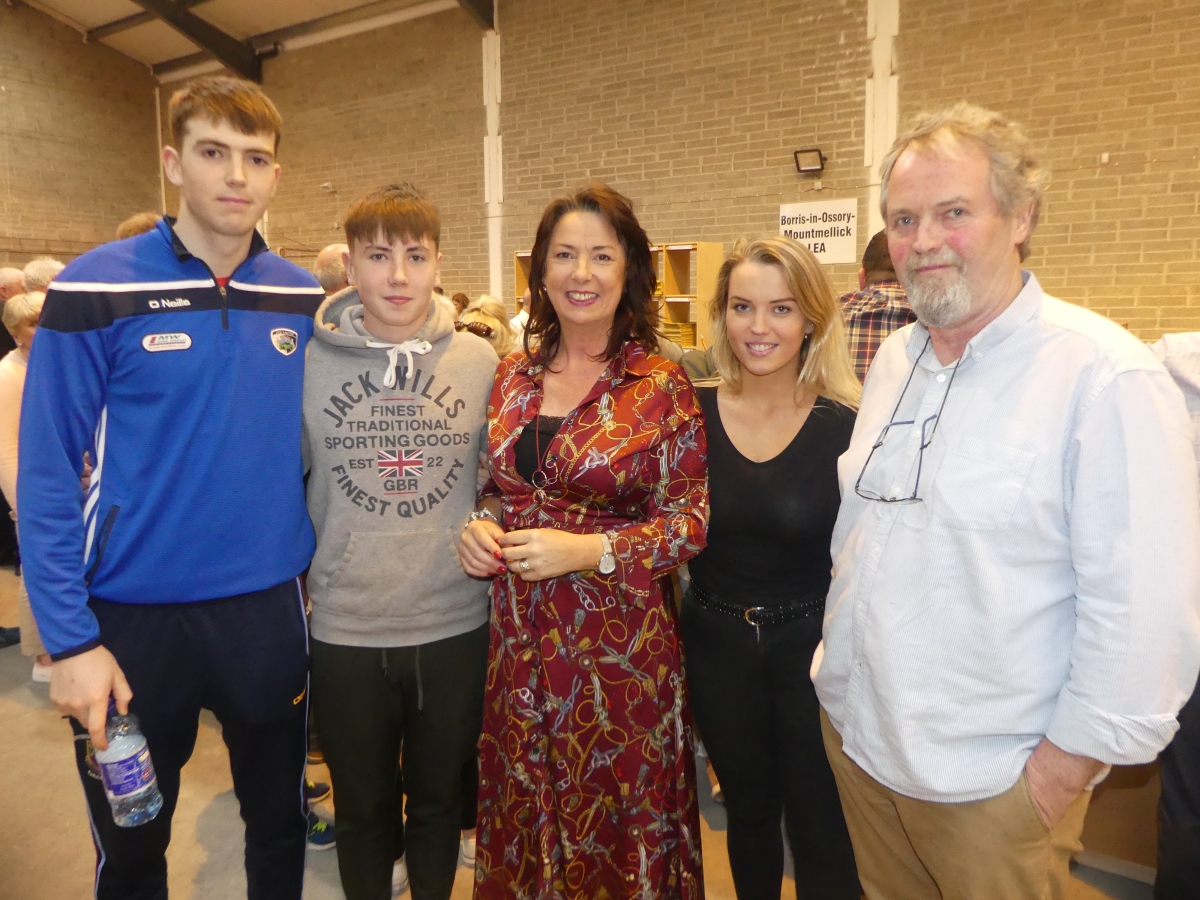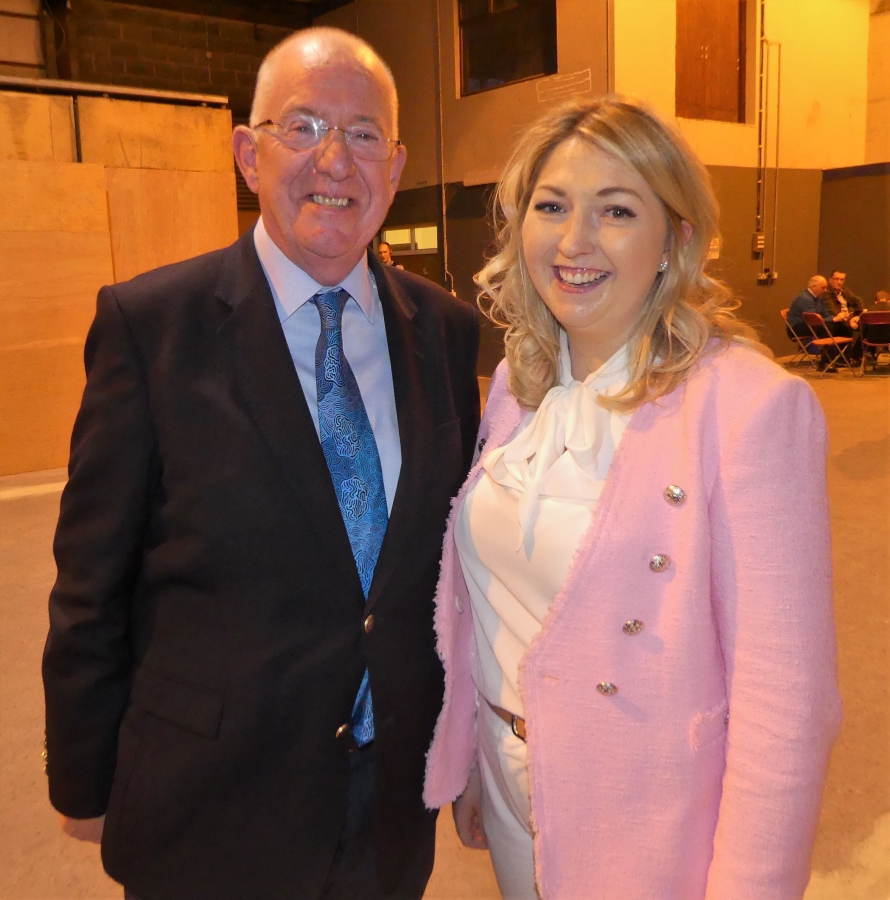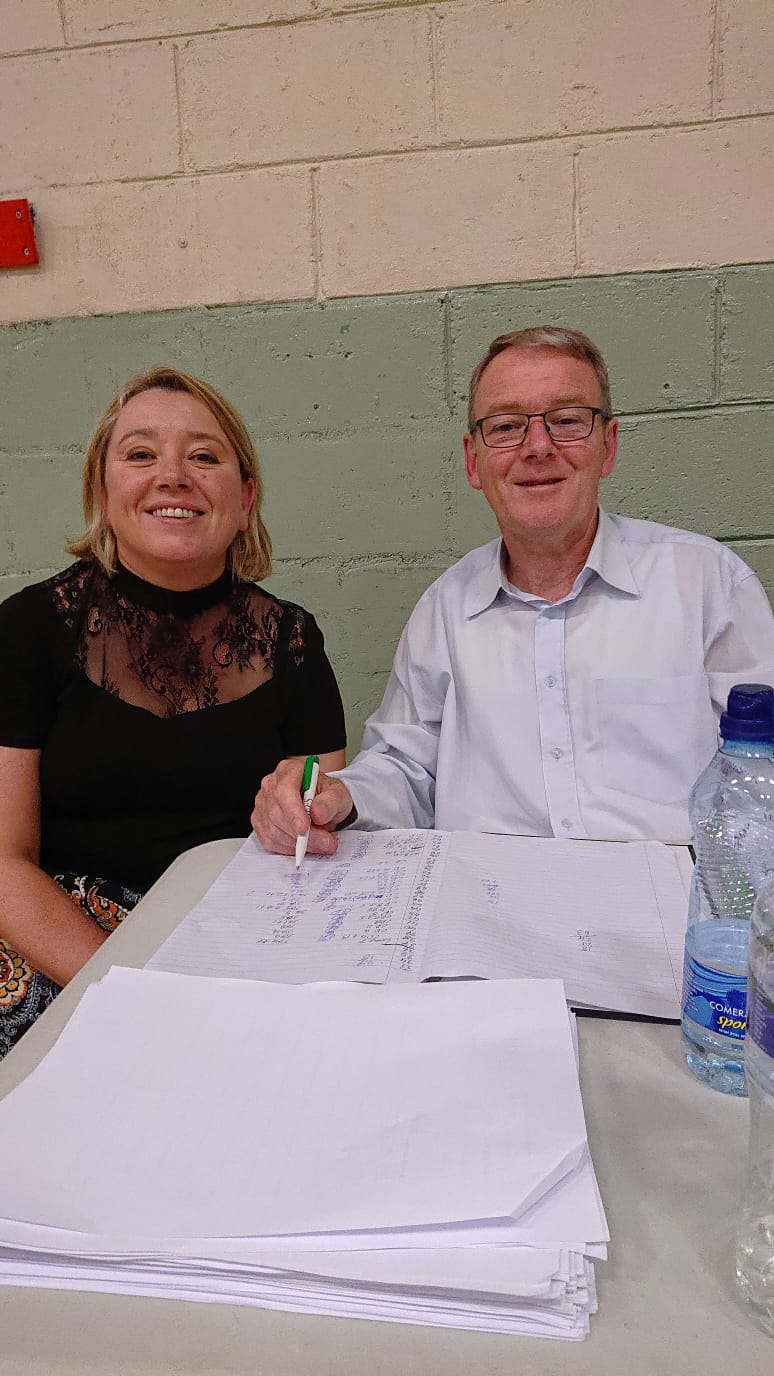A year on, we look back at the drama of last year’s Local Elections in Laois. This piece originally appeared on LaoisToday on the Sunday after all 19 seats were filled on Laois County Council.
At 10.30pm on Monday evening last in a warehouse in Kea Lew Business Park in Portlaoise the last three seats on Laois County Council were finally filled, bringing an end to a three-day process of tallying, sorting, counting and re-counting that had got underway just after 9am on Saturday morning across town in St Mary’s Hall.
It was a marathon saga that entailed three excruciatingly long days but it ended with an absolute bang – six elections in the space of an hour, each one of them greeted more raucously than the last.
The announcements all weekend had been joyously celebrated but things went up a notch when Mary Sweeney and her gang belted out the Skies Oer Ballyroan at half 8 on Monday following her fifth straight election in Portlaoise.
Ben Brennan’s huge support base, who’d waited around patiently and with good humour all weekend, got their moment next at the same time as his new colleague Aisling Moran, retaining the seat in Graiguecullen-Portarlington previously held by her father John for Fine Gael since 1991.
Then it was the turn of Thomasina Connell for the final seat in Portlaoise – again for Fine Gael – before the triple whammy in the gripping Borris-Mountmellick battle of 25-year-old Conor Bergin, Durrow’s Oliver Clooney and outgoing Cathaoirleach John King. Clooney’s crowd even cracked open the champagne.
For the candidates – winners and losers – their families, the Count Centre staff, Returning Officer Donal Brennan, the Gardai, Bosco Ramsbottom and his catering team and the working media, it brought the curtain down on an intense weekend.
Dramatic and enjoyable as it was, there was nobody sorry to see the back of the place.
Yet an Election Count is a unique experience for so many reasons. The setting couldn’t be any more unglamorous if it tried. Bare concrete floors, a cavernous big building, various sections separated by sheets of plywood and most people surviving on bars of chocolate, bottles of mineral and tea or coffee out of paper cups.
For those consumed in it, they’re in a bubble for those couple of days, almost oblivious to what else is going on in the world. Those not at it get a snapshot of the drama through social media but you only get a full sense of it all by being there.
It’s a place where all walks of life come together, all backgrounds, religions and ages. And it’s somewhere you’ll witness every human emotion in the rawest form: excitement, nerves, tension, disappointment, pride, joy, anger, bitterness, sadness and everything in between.
By the end of it all, 19 county councillors, across three different areas had been elected to serve the people of Laois for the next five years.
Here we look back on some of the many various talking points.
Four new faces and changes in every area
A couple of weeks ago, a senior council official observed that there’s a turnover of a third of councillors at each election. Yet with 18 councillors returning and the one retiring one being replaced by his daughter on the ticket, the potential for change looked minimal in Laois heading into this year’s campaign.
When the council does resume next Friday, however, there will be four new faces and changes in each of the three areas.
Aisling Moran did win the seat for Fine Gael in Graiguecullen-Portarlington while Fine Gael also shook things up in Portlaoise with Thomasina Connell displacing Fianna Fail’s Pauline Madigan who had been in the seat for the past year having been co-opted following the death of Jerry Lodge.
But it was in the Borris-Mountmellick area where we witnessed the biggest change with first-time candidates Conor Bergin (Fine Gael) and Ollie Clooney (Independent) dislodging David Goodwin (Fine Gael) and Brendan Phelan (Independent).
Falling turnout
Nationally, turnout was 49.7%, down almost 3% on what it was in 2014 continuing an overall trend of decline.
That decline was even more pronounced in Laois where turnout was 47.1%, down from 51% five years ago. It’s the fourth election in a row in Laois where turnout is down having been 59.58% in 2004 and 54.33% in 2009.
In Graigue-Port turnout was 50.41% (down from 55.27% in 2014) in Borris-Mountmellick it was 58.4% (down from 61.36% in 2014) and in Portlaoise it was 47.54% (down from 51% in 2014).
The count itself
The election count itself was an incredibly slow process with Laois not announcing a first count until after 7pm on Sunday – the last county to do so.
In 2014, the first count was after 11pm on Saturday and was completed in the early hours of Monday. On this occasion it took almost 24 hours longer than it did five years ago.
There was a delay of a couple of hours sorting the votes in St Mary’s on Saturday which delayed the count actually starting but Laois was way behind neighbouring counties Carlow, Kilkenny, Kildare and Offaly.
Longford, however, was the last to finish their count – not doing so until Tuesday evening.
Female candidates increase again
Five of the 19 Laois county councillors are women, an increase on the three elected in 2014 and the four that saw out the last council term.
Mary Sweeney (Fine Gael) and Catherine Fitzgerald (Fianna Fail) were both first elected in the Portlaoise area in 1999 while Caroline Dwane-Stanley (Sinn Fein) was first elected in 2014 in Portlaoise having been co-opted in 2011. Pauline Madigan (Fianna Fail) spent the last 12 months as a councillor and while she lost her seat, it was taken by Fine Gael’s Thomasina Connell.
Fine Gael also added another female in the Graigue-Port area where Aisling Moran was elected.
It all means that female representation is at a record high in Laois County Council at 26% and outside of the cities, only Cavan, Kildare, Louth, Meath and Wicklow have a greater percentage.
Dun Laoighaire-Rathdown have 48% female representation while at the other end of the scale, Longford and Mayo have just 7%.
At general election level, political parties are required to have women make up 30% of their candidates, or lose half of the state-funding they receive.
Of the total 949 councillors elected across Ireland, just under 22% were women.
The Women’s Council of Ireland said “it is very disappointing that in 2019, we still have not broken the critical mark of 30% women’s representation at local level”.
“While a record number of 566 women contested the elections, up from 440 in 2014, they only made up 29% of all of the candidates,” Orla O’Connor, Director of the National Women’s Council said.
“As was the case with the general elections, a gender quota for local elections is a necessity if we are serious about achieving gender equality,” she added.
You can read a full breakdown of the female percentage across the country here.
End of two political dynasties
The afore-mentioned battle in Borris-Mountmellick witnessed two major casualties with Rathdowney’s Brendan Phelan (Independent) and Rosenallis’s David Goodwin (Fine Gael) both losing their seats.
It both cases, it ends a long-standing family tradition. Goodwin was first elected in 1974 while his father William was a councillor for over 20 years before that. Brendan Phelan’s seat also has massive family ties. He was co-opted to that seat following the election of his brother Kieran to the Senate in 2002 but retained it at the three elections following it prior to this year.
Kieran had first been elected in 1991 while their father Pat was a councillor for many years too. Phelan split with Fianna Fail prior to the last election and he spoke about that following the loss of his seat on Monday.
But while the Goodwin and Phelan families are down now, it’s not the first time they’ve been in this situation. Pat Phelan lost his seat in 1985 before Kieran won it six years later, the same election David Goodwin lost his seat only to be re-elected in 1999.
If either families are to turn to the next generation, Brendan Phelan’s son Brian and David Goodwin’s son Bill could be in the mix down the line. Both were present at tallies and count throughout the weekend and while both have young families now, it wouldn’t be overly surprising to see one or both of them enter the fray at some stage.
What now for Fianna Fáil?
Was this a good or bad election for Fianna Fail? Yes, they lost that Jerry Lodge seat in Portlaoise but that was always going to be a battle to hold on to, particularly after the way the cumann in Portlaoise went to war with itself over the co-option of Pauline Madigan.
Their overall vote only dropped marginally from 2014 (32.8% to 32%) but they go back into the council with only six seats, one less than what they went out with and the lowest-ever representation in their history.
The number of seats decreased the last time but Fianna Fail have gone from 14 seats in 1999 to 11 in 2004, eight in 2009, seven in 2014 and now just six.
It was a case of their strong sitting councillors getting stronger on this occasion. Padraig Fleming topped the poll in Graiguecullen-Portarlington, John Joe Fennelly was elected on the first count in Portlaoise and Paddy Bracken took the first seat in Borris-Mountmellick.
All three of those increased their vote substantially, as did Paschal McEvoy, Catherine Fitzgerald and Seamus McDonald.
But Pauline Madigan and Donal Kelly never seriously challenged for the last seat in Portlaoise and Deirdre O’Connell-Hopkins in Portarlington and former GAA President Liam O’Neill and the Clonaslee-based Declan Good in Borris-Mountmellick were never in the mix either.
Madigan is on the FF ticket for the next General Election with TD Sean Fleming and while Fleming has plenty of years left in him yet, there is nobody standing up as an heir apparent. Former TD and Junior Minister John Moloney put himself forward to go for convention last year and though he later withdrew, he is still very visible on the local political scene.
By the time the next Local Elections come around in 2024, their sitting councillors will have an average of almost 25 years service each. The party do have a number of active young members – like chairman Joe Dunne, secretary Thomas Foy and PRO William Delaney and the could be primed to go forward in the coming elections.
Changing face of Fine Gael
Fine Gael find themselves in the opposite position that Fianna Fail are in, seeing their vote fall but their candidates increase.
They are now the main party in the council with seven seats – three of whom are new faces.
Aisling Moran (Graigue-Port), Thomasina Connell (Portlaoise) and Conor Bergin (Borris-Mountmellick) are new with John Moran and David Goodwin making way. Willie Aird, with a fourth poll-topping display in a row, Tom Mulhall, John King and Mary Sweeney also consolidated.
Vivienne Phelan and Fergal Conroy were probably disappointed with their performances but Bergin is arguably the biggest success story of the election, the 25-year-old, who works in Charlie Flanagan’s office, returning a massive vote in his first election.
It now looks as if Flanagan’s local Fine Gael team is as strong as it has been in a long time. Thomasina Connell was a General Election candidate in 2016 and now has a council seat. She will fancy a shot at a Dail seat again too while Bergin and Moran can’t be discounted either.
Like Sean Fleming, Flanagan may not be going anywhere just yet but the party’s options are increasing and there could be a queue forming behind him.
Problems for Sinn Fein?
Sinn Fein did better in Laois than around the country and held onto the two seats comfortably with Aidan Mullins elected on the first count in Graiguecullen-Portarlington and Caroline Dwane-Stanley again taking the third seat in Portlaoise as she did five years ago.
Lorna Holohan-Garry polled strongly in Borris-Mountmellick without ever challenging for a seat, just as Rhoda Dooley-Brogan did in 2014. With a bit extra, they wouldn’t be far off challenging for a seat there.
But with the swing against the party at the moment – and Local Elections regularly being a good barometer for a General if it’s held within two years – their Dail seat in Laois-Offaly could be under pressure.
The party has totally collapsed in Offaly following the departure of Carol Nolan – losing all three of their council seats and seeing their vote collapse from 17.4% to 4.6%.
And the loss of Aidan Mullins’ stronghold in Portarlington to the new Kildare South constituency will be felt too.
Conversely, they’re now strong in Kildare South – with Ballybrittas native Patricia Ryan, who narrowly missed out in the last General Election, winning a seat in Monasterevin in these Locals.
Labour gains
The Labour party ran two candidates on this occasion in Laois, down from three in 2014.
But with Noel Tuohy massively growing his vote in Portlaoise to be easily returned and Eoin Barry putting in a huge campaign in Graigue-Port only to lose out to Aisling Moran for the final seat, they grew vote from 4.7% to 5.6%.
Barry pulled in votes from across his district but finished 138 first preferences behind Moran – to have a chance of winning that seat he needed to be well out in front on the first count, given that Moran got over 250 transfers from Phelan to be elected.
Barry could be Labour’s name on the General Election ticket and as a young candidate, the increased profile would leave him in a stronger position to challenge in 2024.
Missed opportunity for Greens?
The Green Party were the big winners of the Local Elections nationally but didn’t even have a candidate in Laois.
Emo’s Sinead Moore ran for the party in the 2016 General Election in Laois when she got 1,541 first preferences but living in Dublin, she ran unsuccessfully for Aontu in the Locals in Fingal.
With Pippa Hackett elected in the Edenderry area in Offaly, and set to run in the next General Election, it was perhaps a missed opportunity not to run someone on this side of the border, particularly in Portlaoise.
Looking to 2024?
Given the nature of elections, there was multiple family members knocking around the Count Centre over the weekend and it was almost a running joke for someone to suggest to a son, daughter, niece or nephew of a councillor that “they’ll be next”.
But with so many of the current councillors with such experience and some of them hinting that this will be their last term, there could be more gaps in 2024 than there was this time.
The losing candidates with ambitions of going again don’t need to look too far for a reminder that it often takes a couple of efforts to get across the line.
Paschal McEvoy and Aidan Mullins were both defeated in 2009 but elected in 2014 while John King didn’t make in 1999 or 2004 but was successful in 2009 and again in 2014 and on this occasion.
In this game, perseverance can often pay off.
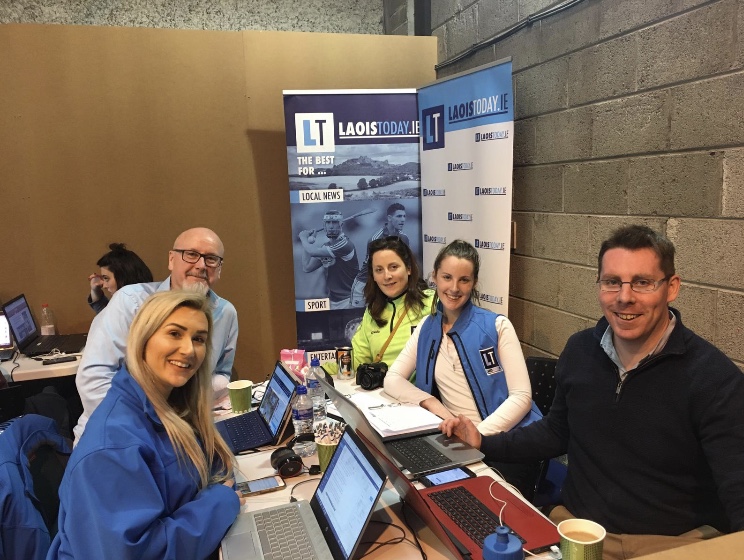
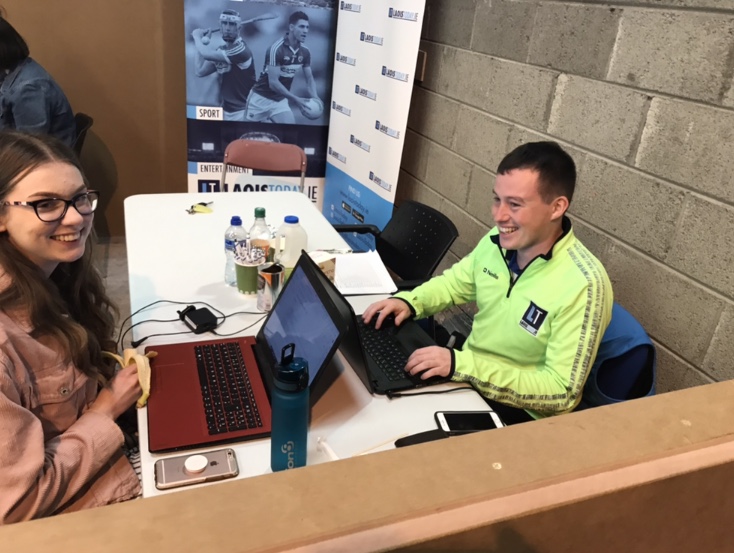
LaoisToday coverage
It was our pleasure to cover this year’s Local Elections, the first election since LaoisToday was set up in February 2017.
We received massive feedback on our extensive coverage over the weekend, in particular the Live Blog which proved incredibly popular.
Traffic levels to the site and our app went through the roof and to record levels on Saturday, Sunday and Monday and we’re proud to have led the way with the most in depth coverage going right back a number of months.
Until the next one …
SEE ALSO – Check out all of the 2019 Local Election coverage on LaoisToday
